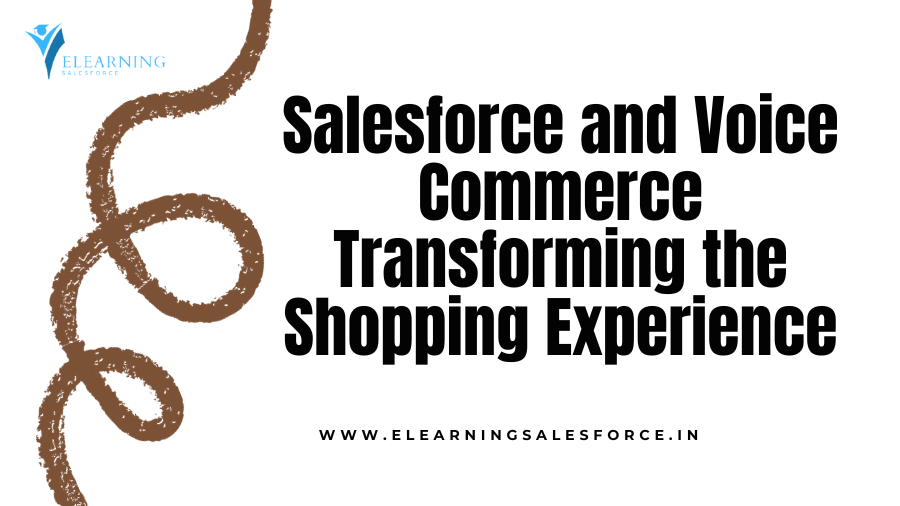Introduction to Salesforce and Voice Commerce
In a world where convenience is king, the marriage of Salesforce and voice commerce is reshaping how consumers interact with businesses. Voice commerce, powered by virtual assistants and smart speakers, is not just a trend; it’s a paradigm shift in the way we shop.
The Rise of Voice Commerce
Voice commerce, or v-commerce, refers to the use of voice-activated devices and technologies for making online purchases. With the increasing popularity of virtual assistants like Siri, Alexa, and Google Assistant, voice commerce has become a significant player in the e-commerce landscape.
Salesforce’s Role in Voice Commerce Revolution
1. Integration with Voice Assistants
Salesforce’s seamless integration with popular voice assistants enables businesses to provide a voice-driven shopping experience. This integration allows for natural and intuitive interactions between customers and the Salesforce-powered e-commerce platform.
2. Enhanced Customer Experience through Voice
Salesforce amplifies the customer experience in voice commerce by leveraging its CRM capabilities. Customer preferences, purchase history, and personalized recommendations can be seamlessly integrated into voice interactions, creating a more engaging and tailored shopping experience.
3. Data Security in Voice Commerce
Salesforce prioritizes data security in voice commerce transactions. Advanced encryption and authentication measures ensure that sensitive information exchanged during voice transactions remains secure.
Benefits of Incorporating Salesforce in Voice Commerce
1. Seamless Omnichannel Experience
Salesforce enables businesses to provide a unified and consistent shopping experience across various channels, including voice commerces. This ensures that customers enjoy a seamless transition between voice interactions and other touchpoints.
2. Personalization through Voice Data
The integration of Salesforce allows businesses to leverage voice data for personalized marketing and product recommendations. This level of personalization enhances customer loyalty and satisfaction.
3. Efficient Order Management
Salesforce streamlines order management processes in voice commerces, providing businesses with real-time insights into inventory, order status, and customer preferences. This efficiency translates to quicker and more accurate order fulfillment.
Real-world Examples of Salesforce Empowering Voice Commerce
Explore success stories of businesses that have embraced Salesforce in their voice commerces strategies, showcasing tangible improvements in customer engagement and sales.
Overcoming Challenges in Implementing Voice Commerce with Salesforce
1. User Adoption and Training
Ensuring that both customers and internal teams are comfortable and adept at using voice commerce features is crucial. Salesforce offers comprehensive training resources to facilitate smooth adoption.
2. Privacy Concerns
Addressing customer privacy concerns is paramount. Salesforce’s commitment to data security and transparent privacy policies helps build trust with users.
3. Technological Integration
Integrating voice commerce into existing technological infrastructure can be challenging. Salesforce provides robust tools and support for a seamless integration process.
Future Trends in Salesforce and Voice Commerce
Look ahead to emerging trends, such as AI-driven voice interactions, increased integration with IoT devices, and further advancements in natural language processing within the Salesforce ecosystem.
Steps to Implement Salesforce in a Voice Commerces Strategy
1. Assessing Business Needs
Understand the specific requirements and goals of your business to tailor the Salesforce-powered voice commerces strategy accordingly.
2. Integration Planning
Carefully plan the integration of Salesforce with voice commerce, ensuring that it aligns with existing business processes and enhances the overall customer journey.
3. User Training and Onboarding
Invest in comprehensive training programs to ensure that both customers and internal teams are well-equipped to utilize the voice commerces features powered by Salesforce.
4. Continuous Optimization
Regularly assess and optimize your voice commerce strategy, leveraging Salesforce’s analytical tools to refine the customer experience and improve operational efficiency.
Comparing Salesforce in Voice Commerces with Other Solutions
Explore how Salesforce’s approach to voice commerce compares with other solutions, considering factors such as user experience, integration capabilities, and adaptability to evolving technologies.
Cost Considerations and ROI in Salesforce-Powered Voice Commerce
Understand the financial aspects of implementing Salesforce in voice commerce, including upfront costs, ongoing expenses, and the expected return on investment for your business.
Tips for Businesses Venturing into Salesforce-Enhanced Voice Commerce
1. Prioritize User Experience
Place a strong emphasis on creating a user-friendly and enjoyable voice commerce experience to drive customer satisfaction and loyalty.
2. Emphasize Data Privacy
Transparently communicate data privacy measures to build trust with customers and address concerns related to the use of voice-activated technologies.
3. Stay Agile and Adaptive
Voice commerce is a dynamic field. Stay agile, adapt to evolving technologies, and be open to incorporating new features and improvements.
Common Misconceptions about Salesforce and Voice Commerce
Dispelling common myths about Salesforce’s role in voice commerce clarifies expectations and helps businesses make informed decisions about their technology investments.
Conclusion
Salesforce and voice commerce are not just tools; they’re architects of a new era in e-commerce. The marriage of CRM capabilities with the ease of voice interactions reshapes how businesses and customers engage, creating a more natural and personalized shopping experience.
FAQs
- Is voice commerce secure with Salesforce?
- Yes, Salesforce prioritizes data security, employing advanced encryption and authentication measures to safeguard voice commerces transactions.
- How does Salesforce enhance the omnichannel experience in voice commerce?
- Salesforce ensures a seamless transition between voice interactions and other channels, providing customers with a consistent and unified experience.
- What steps can businesses take to address privacy concerns in voice commerce?
- Transparently communicate privacy measures, assure customers of data security, and adhere to transparent privacy policies.
- Is Salesforce voice commerces suitable for small businesses?
- Yes, Salesforce’s adaptability makes it suitable for businesses of all sizes, offering scalable solutions tailored to individual needs.
- How can businesses measure the success of their Salesforce-powered voice commerces strategy?
- Key metrics include increased sales, customer satisfaction, and the efficiency of order management processes.




